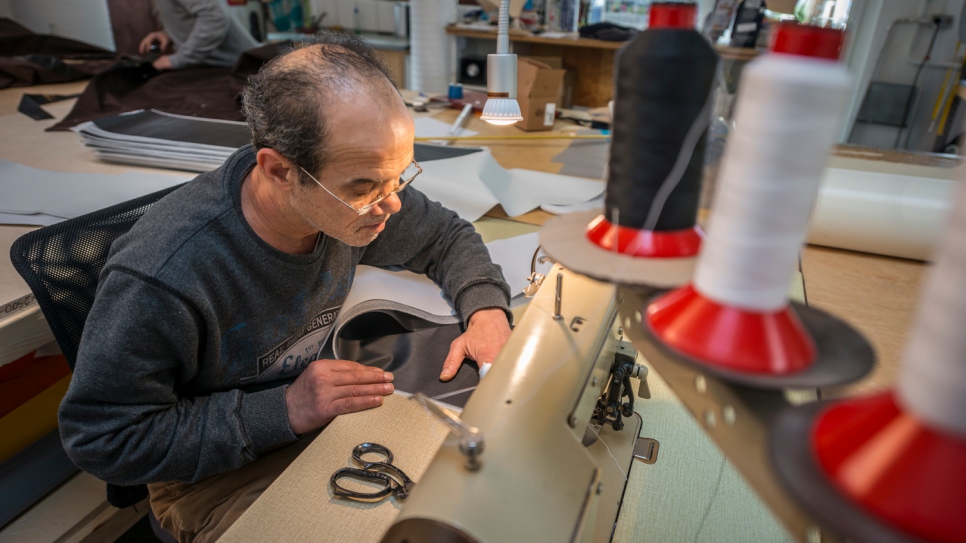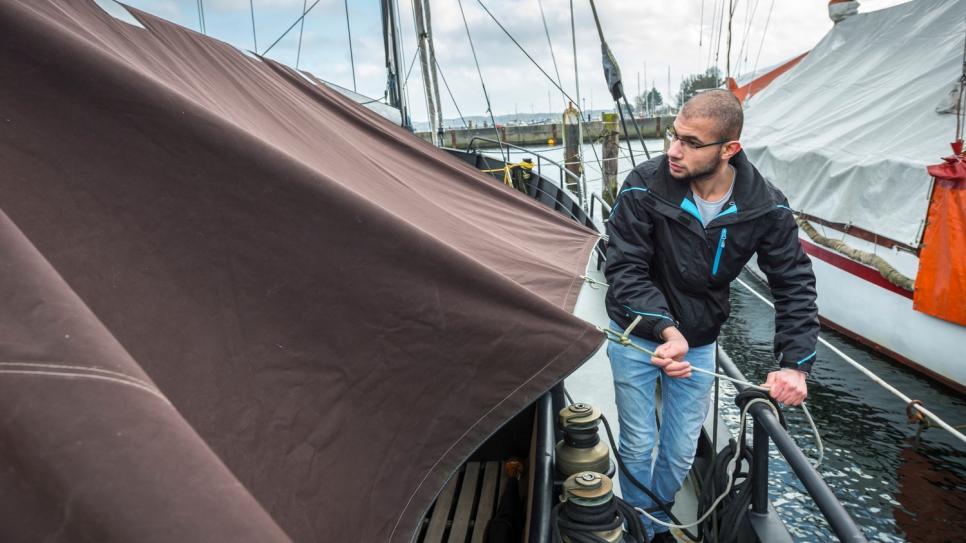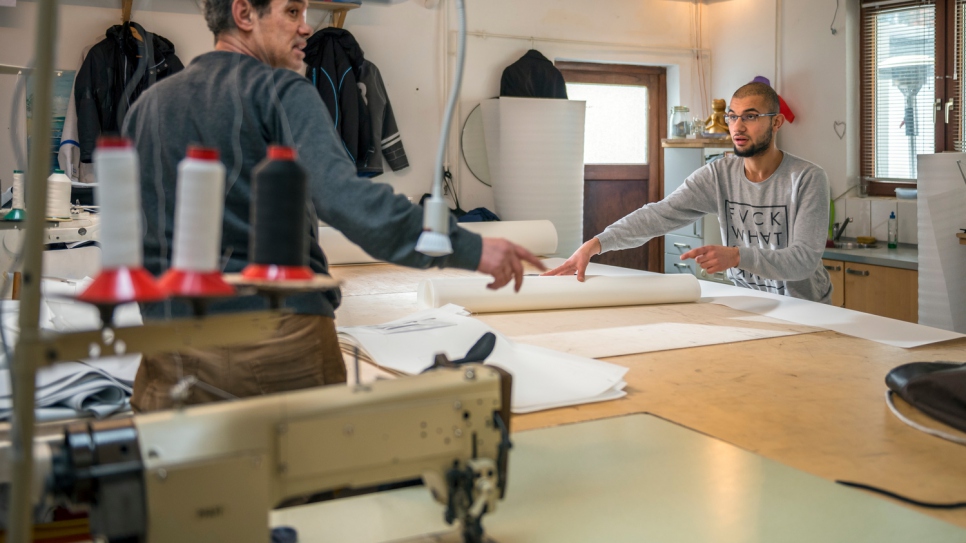Syrians find outlet for sewing skills with German sailmaker
Curtain makers Mohammed Alsahani and his son Yousef have helped fulfil the demand for skilled labour at a sailmaking workshop near Kiel.
Mohammed and Yousef provide skilled labour at the sailmaking company Coastworxx.
© UNHCR/Gerhard Westrich
In a quiet textile workshop in northern Germany, far from the dangers and turmoil of war, Syrian refugees Mohammed Alsahani and his son Yousef measure, cut and stitch sailcloth to precise designs.
The pair have found work with a sailmaker near the port of Kiel, repairing damaged sails and making sunshades, clothing and accessories from old sailcloth, poring over bolts of the hard-wearing fabric draped across wooden workbenches.
Mohammed, who used to make curtains in Damascus, has adapted his skills to meet the demands of life on the Baltic coast. Together with his younger son, Yousef, he works full-time at Coastworxx, a textile workshop near the city.
Mohammed was surprised how easily he made the switch to sewing sails. “I remember the first time we had a sail that had to be repaired,” said Mohammed, 51, speaking through a translator.
“I’d never done that before, but I just watched what the others did. The next one I did by myself. I was very glad to see I could do this job.”
Coastworxx's chief executive, sailmaker Christian Lübbe, was delighted to find so many enthusiastic and skilled textile workers among Kiel’s newest arrivals. His small workforce of nine now includes four asylum-seekers and refugees from Syria and Afghanistan.
“Mohammed and Yousef are much better than some of the Germans I’ve had as trainees,” Christian said. “We don’t need many words. Mohammed and I understand each other because he knows everything about the work. I just show him the designs and it works out.”
“We have a big chance with these guys to get these jobs done and keep these small companies going.”
German companies that rely on craft skills suffer from a labour shortage, he said.
“Now a lot of people have come here with the skills, who are able and willing. We have a big chance with these guys to get these jobs done and keep these small companies going.”
Both sides benefit. For Mohammed and his family, who faced a long ordeal to reach and be reunited in Germany, finding work at Coastworxx has made a vital difference to their struggle to rebuild their lives.
“I’m so happy to have the work,” said Yousef, 23, who plans one day to set up his own workshop with Mohammed and his brother Ahmed. “It’s a very good thing for us to work. Also for Germany, I think. I’ve learned a lot from my father.”
As a teenager in Damascus, Yousef often helped in his father’s workshop, where, besides curtains, they made bespoke light fittings, mosaics and tiles. As war closed in, Yousef, then 18, fled alone to Turkey to avoid being drawn into the fighting.
A year later, Ahmed followed. Then, only after many friends and his nephew had been killed, Mohammed also left in spring 2014, taking Yousef’s young sister Hanan and his mother, Soozanne.
“I worked so hard in Damascus, and then the war came,” said Mohammed, fighting back tears. “So many people were killed in Syria, every day. One day it will end. All wars have to end. But I’m sad because so many had to die. We’re just people. We just want to live.”

Yousef (right), 23, lays out a boat cover he repaired with colleague Markus Hafner, 18, at the Coastworxx factory near Kiel, in northern Germany. © UNHCR/Gerhard Westrich
From Turkey, Mohammed and Ahmed decided to go on to Europe and send for the women once they were safe. They reached Greece on a flimsy rubber boat, paid smugglers to fly them to Switzerland, and then took a train to northern Germany.
Yousef, meanwhile, took a different route. Working alone as a carpenter in Turkey, he saved enough money to travel to Italy. In late 2014, he boarded a boat, paying thousands of euros to smugglers and trusting them with his life.
However, disaster struck at sea. The smugglers turned on the 73 passengers, claiming they had not received their money, and said they would divert the boat elsewhere. Eleven days later, the boat arrived on the Egyptian coast.
“They know we’re just human beings who need help, that we just want to live without war.”
None of the passengers, including Yousef, were carrying official documents. The group was arrested and taken to a police detention facility. The charges against them were dropped, but it was another eight months before they were released.
“You don’t know what that felt like, being in prison and not knowing what would happen,” Yousef said. “All my money was gone. Every day I asked myself, how do I get out?”
He remained in contact with his family by phone, but they were unable to help him.
In June 2015, delegations from Sweden, France and Germany agreed to resettle the prisoners to Europe. A relieved Yousef found himself on a flight to Germany, on his way to join his father and brother in Kiel. Soon afterwards, his mother and sister arrived from Turkey as part of a family reunification programme.
About this time, a chance meeting brought sailmaker Christian into contact with Mohammed, Yousef and Ahmed. After a trial period, Christian employed Mohammed and Yousef full-time in his workshop. Ahmed, 25, is planning to return to university.
Mohammed shares a flat near the workshop with his 44-year-old wife and daughter Hanan, 15, who is in secondary school. Last autumn, Yousef also moved into his own place after initially living with a German host family.
“It’s really amazing – so many German people have helped us,” said Yousef, in the German he has learned from his student friends. He spends a lot of his free time with Christian and his family. “We eat together, we go for walks, we go surfing. We do a lot together. After living in the prison so long I wanted to think about positive things.”
“It’s very beautiful here, especially in summer,” he said. “Germany has become a second homeland for me. The people here are very good. Everyone here knows what has happened in Syria. They know we’re just human beings who need help, that we just want to live without war.”





